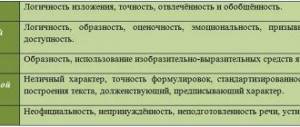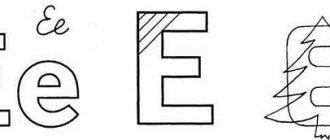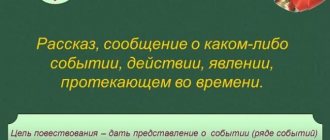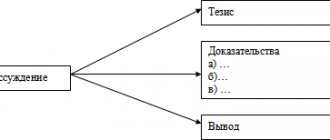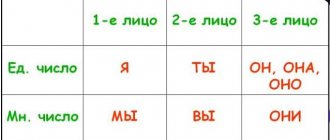Lesson summary “Direct and figurative meaning of words” in Russian for grade 2
Lesson _____ Topic: Direct and figurative meaning of words (2 hours)
Goals:
1) Introduce students to the direct and figurative lexical meaning of words
2) To develop the ability to find words with a figurative meaning in the text, to use words with a figurative meaning in your speech.
LESSON PROGRESS: 1
- Organizing time.
- Repetition of what has been learned.
Terminological dictation.
Based on the interpretation of the word, determine the word and write it in its initial form. 1 student is working at the board.
- The science that studies the vocabulary of a language is called...(lexicology)
- The vocabulary of a language is called ... (vocabulary)
- What the word means is called...(lexical meaning)
- A word that has one lexical meaning is called... (unambiguous)
- A word that has two or more meanings is called... (multiple meanings)
- The dictionary by which the lexical meaning of a word is determined is called ... (explanatory dictionary)
- The concept of literal and figurative meaning.
1) Teacher's word:
— Children, before announcing the topic of today’s lesson, I want to ask you a question related to literature, do you know who Ilya Muromets is?
(People's hero, hero of many epics)
In one of the epics about Ilya Muromets there are these words: “The word is like an apple: green on one side, ruddy on the other, you know how to turn it, girl...”
Think about the meaning of this sentence: The word, if you look at it from different sides, is different - “green on one side,” “ruddy on the other.” And most importantly: “You know how to do it, girl
turn over”, i.e. know how to master a word, since a word can have more than one meaning.
It turns out that a word, in addition to its direct meaning, can also have another meaning,
portable. So the topic of the lesson is: “The direct and figurative meaning of the word”
— Listening to lines from “The Tale of Tsar Saltan” by A.S. Pushkin
— What does the word “golden” mean? The squirrel sings songs and gnaws all the nuts; And the nuts are not simple, All the shells are golden, The kernels are pure emerald.
“Golden shells”, that is, shells made of gold. The word “golden” is used in its literal meaning.
— Listening to an excerpt from the poem by the poet I. Nikitin, Golden Fields, The smooth surface and shine of lakes, Bright bays, Endless space.
— What does “golden fields” mean? Similar to the color of gold. Here the word based on similarity in color has a figurative meaning.
— Thus, the word “golden” can have both direct and figurative meaning.
2) Write on the board:
iron nails, iron health.
In the phrase iron nails, the adjective means “made of iron,” and in the phrase iron health, the adjective means “strong, strong.” Why is the same word iron used in these seemingly distant meanings? Things made of iron are durable and strong. Health can be very strong, like iron. That is why they began to call good health iron. So the word iron, along with its direct meaning, acquired a figurative meaning.
3) Recording phrases (performed with spelling explained to the student):
golden ring, golden word
4) Question to the class: In which phrases is the word golden used in a literal sense, and in which in a figurative sense?
(Golden ring in the literal meaning, i.e. made of gold, a very valuable metal: The attribute is named directly. In the second phrase, “golden” means “very good, valuable as gold.” In this case, the name of the attribute of one object is transferred to the attribute of another object What the word and
gold is not a material, but a value. The word golden has a new lexical meaning based on transfer. This meaning is called portable).
5) Exercise 254 p. 82
6) Task: Find 2-3 words with a figurative meaning in the school explanatory dictionary, make common sentences with the selected words.
7) Teacher: Sometimes it’s difficult without an explanatory dictionary, and without knowing the figurative meaning, we may not understand each other. Listen to what happened to one foreigner.
A foreigner approaches a berry seller.
- What do you sell?
- Blackcurrant.
- Why is she white?
- Because it's green.
 Question to the class: What is the meaning of the word green?
Question to the class: What is the meaning of the word green?
(Unripe, unripe)
9) Assignment: In each pair of sentences, indicate words used in literal and figurative meaning.
1. The wind howls and whistles in the chimney. The dog howls.
2. The tired day turned to night. The tired boy leaned his head on his mother's shoulder.
3. Dad came home from work. The long-awaited day of departure has finally arrived.
4. The hostess warmed the water. A cheerful song warmed us on the way.
- Lesson summary.
Questions for the class:
a) How does a figurative meaning differ from a direct one?
b) Why are words with figurative meanings used in speech? (For imagery and expressiveness of speech)
Test for consolidation of the studied material.
Assignment: write down the letter indicating the correct answer.
Test.
1. Science studies the vocabulary of a language:
A) phonetics B) syntax C) lexicology D) punctuation
2. The word is used figuratively in both phrases:
A) heart of stone, build a bridge B) heat of the sun, stone building C) golden words, make plans
3. In which series are the words ambiguous:
A) star, artificial, stone; B) single, blinds, jockey; B) stony, caftan, composer
- Homework.
§ 34, ex. 256 pp. 83-84
Date _____
Lesson _____ Topic: Direct and figurative meaning of words (2 hours)
Goals:
1) Introduce students to the direct and figurative lexical meaning of words
2) To develop the ability to find words with a figurative meaning in the text, to use words with a figurative meaning in your speech.
LESSON PROGRESS: 2
- Organizing time.
- Repetition of what has been learned.
- Syntax five minutes
Write down a proposal
Insert and explain punctuation marks
The poet S. Narovchatov wrote: The more complex human society became, the more complex and rich the language became.
Confirm with examples that the vocabulary of a language changes.
What is the meaning of the word “ rich”
»?
Come up with sentences that confirm the polysemy of the word “ rich”
».
- Work on the topic
- Selective dictation
Option 1: write down phrases with the direct meaning of words
Option 2: write down phrases with figurative meanings of words
Heavy bag; Olympian calm; iron rod; difficult character; easy prey; iron discipline; light burden; gold brooch; cold look; golden character; cold coffee.
- Creative work
With the words STAR, HOT, FRAGILE, RUN, make up 2 phrases each: with the direct and figurative meaning of the word.
- For observation
-In what combinations will the polysemantic word black have a direct meaning?
- Choose a title for each column.
Come up with 2 sentences using phrases from each column.
golden dawn golden coin hot desire hot water heavy feeling heavy bag angry winter angry neighbor sleepy birches sleepy girl silk braids silk threads fragrant spring fragrant honey
- Make up phrases with the word “golden”
Name phrases with literal and figurative meanings of the word
- Using words with figurative meanings in literary texts
Find words with a figurative meaning. Which style of speech often uses words in a figurative sense?
Long blue shadows fall from the trees, and you can breathe freshly
in the sharp frosty air.
Review the proposals. Find words in variable meaning
The sea slept motionless under the ice cover.
Leaden clouds covered the horizon.
- Lesson summary
Exercise 255 page 83
- What did you learn in the lesson?
- In what style of speech are words used figuratively?
- Homework.
Describe a winter day using words in a figurative sense.
§ 34 ex. 257
Characteristics of direct value
All people have an intuitive idea of what the literal and figurative meaning of a word is. If we speak in the language of ordinary people, the direct meaning is the most common meaning that is put into a word; it can be used in any context, directly pointing to a specific concept. In dictionaries, the direct meaning always comes first. Below the numbers are figurative meanings.
All lexical units, as mentioned above, can be divided into single-valued and polysemous. Unambiguous words are those that have only a direct meaning. This group includes terms, words with a narrow subject-matter, new, not yet very common words, proper names. Perhaps, under the influence of the development processes of the language system, words of these categories may acquire additional meanings. In other words, lexical units representing these groups will not necessarily always be unambiguous.
How words are used figuratively: examples
Words in a figurative sense are often used as an expressive means of fiction, the media, and also in advertising. In the latter case, the technique of deliberately colliding different meanings of one word in the subtext is very popular. Thus, advertisements say about mineral water: “A source of vigor.” The same technique is visible in the slogan for shoe polish: “Brilliant protection.”
The authors of works of art, to give them brightness and imagery, use not only the already known figurative meaning of words, but also create their own versions of metaphors. For example, Blok’s “silence blooms” or Yesenin’s “birch Rus'”, which over time became very popular.
There are also words in which the transfer of meaning has become “dry”, “erased”. As a rule, we use such words not to convey an attitude towards something, but to name an action or object (go to a goal, the bow of a boat, the back of a chair, etc.). In lexicology they are called nominative metaphors, and in dictionaries, by the way, they are not designated as figurative meaning.
Characteristics of figurative meaning
This topic will definitely be chosen by any Russian language teacher at school for certification. “The direct and figurative meaning of a word” is a section that occupies a very important place in the structure of the study of Russian speech, so it is worth talking about it in more detail.
Let's consider the figurative meaning of lexical units. The additional meaning of a word that appears as a result of indirect or direct nomination is called figurative. All additional meanings are related to the main meaning metonymically, metaphorically or associatively. The figurative meanings are characterized by blurred meanings and boundaries of use. It all depends on the context and style of speech in which the additional meaning is used.
Particularly interesting are cases when a figurative meaning takes the place of the main one, displacing it from use. An example is the word “bulda”, which originally meant a heavy hammer, and now a stupid, narrow-minded person.
